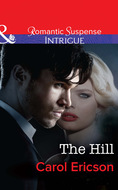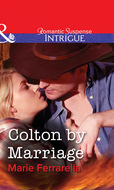Raamatut ei saa failina alla laadida, kuid seda saab lugeda meie rakenduses või veebis.
Loe raamatut: «Secret Agent, Secret Father»
Secret Agent, Secret Father
Donna Young

MILLS & BOON
Before you start reading, why not sign up?
Thank you for downloading this Mills & Boon book. If you want to hear about exclusive discounts, special offers and competitions, sign up to our email newsletter today!
Or simply visit
Mills & Boon emails are completely free to receive and you can unsubscribe at any time via the link in any email we send you.
Table of Contents
Cover Page
Title Page
About the Author
Dedication
Chapter One
Chapter Two
Chapter Three
Chapter Four
Chapter Five
Chapter Six
Chapter Seven
Chapter Eight
Chapter Nine
Chapter Ten
Chapter Eleven
Chapter Twelve
Chapter Thirteen
Chapter Fourteen
Chapter Fifteen
Chapter Sixteen
Chapter Seventeen
Chapter Eighteen
Chapter Nineteen
Chapter Twenty
Chapter Twenty-One
Chapter Twenty-Two
Chapter Twenty-Three
Chapter Twenty-Four
Epilogue
Copyright
DONNA YOUNG, an incurable romantic, lives in beautiful Northern California with her husband and two children.
To Wendy and Jimmy, I love you, Mom and Dad.
Chapter One
With the pain came consciousness.
It pierced the cataleptic depths with jagged teeth that gnawed through skull and skin.
The man lifted his head, testing. Blood coated his tongue, coppery and thick. He groaned as the nausea tightened his gut, pressed into his chest.
They’re coming! The words screamed at him through the blanket of fog, adding a bite to the pain. His eyes fluttered open. Blurred lines altered, then cleared into comprehensible patterns.
Rain trickled in through the half-shattered windshield. The splatter of water mixed with his blood turning the air bag pink in the semidarkness. A light pole lay bent across the top of the sports coupé, its base uprooted from the cement.
How long had he been unconscious? He shifted, trying to relieve the pressing weight on his lungs, focusing on the half-deflated air bag wedged between the steering wheel and his chest.
A shaft of white heat impaled his right shoulder. He let out a slow hiss.
After a moment, he pulled his other arm in from the driver’s side window, noting for the first time he held a pistol tight in his grip. The silver flashed in the night. The cold steel felt good in the palm of his hand. No, more than good, he thought. Familiar.
He fumbled with the safety belt, released the lock. Tightening his jaw, he shoved his good shoulder against the car door, stiffened at the new surge of pain, the wave of dizziness. Metal scraped, glass crackled. Another push and the door gave way. Slowly he slid through the opening and then stood, using the mangled roof for support.
Sirens wailed in the distance. Instinctively he turned. Bile rose, burned his throat. The ground tilted beneath him. Swearing, he fell to his knees and vomited.
They were coming for him. Cops. Rescue workers. It didn’t matter which. Both filed reports.
Reports left paper trails.
With gun in hand, he waited a moment for his stomach to settle, using the time to get his bearings.
Rows of houses, dull with age and earth-toned brick, flanked the street. Each with covered porches that lay behind picket fences or scattered hedges. Each containing onlookers, mostly white-haired couples, their arms tightly wrapped over their chests, holding closed a variety of plaid and terry cloth robes.
Those who didn’t brave the elements took protection from the rain behind the narrow bay windows of their homes. Their fingers held the curtains slightly apart, while eyes squinted with curiosity and fear, deepened the grooves of their features.
Enough fear to keep them away from the armed stranger who had invaded their quiet suburban neighborhood.
Carefully, he turned his head, his eyes searching the shadows of the road. How far was he from her?
A bent street post lay no more than five feet from the wrecked light pole. Proctor Avenue?
Too far, his mind whispered. Too far to help.
The sirens grew louder placing his rescuers no more than a few minutes out.
Hot needles pricked his eye sockets and images began to swim. A black fog seeped in, setting off another wave of dizziness. Struggling against the void, he rammed his injured shoulder into the car. Pain exploded through his arm, jarring his spine, driving consciousness forward, forcing the obscurity back.
Sheer willpower put him on his feet. He swayed, then stumbled. Warn her, his mind screamed. Before he passed out. Before his enemies found him.
Or worse, the whisper came. Before they found her.
Chapter Two
A storm swept over the outskirts of Annapolis. The air crackled and snapped, alive with the hum of lightning, the boom of thunder. Below, stinging sheets of rain pounded water and land with heavy fists, spurred by the fierce Chesapeake winds.
Grace Renne stood by her bay window holding one billowing curtain in her grip. When the bark of the storm reached her, a twinge of sadness worked up the back of her throat.
For the last several years she’d lived on the bay, admiring the city’s fortitude, appreciating its history. It was a city born amidst the turmoil of the American Revolution. Timehonored traditions cemented every cobblestone, forged every piece of iron, framed every structure for more than three hundred years.
Grace caught a whiff of burning wood—fireplaces combating the early autumn chill. Underneath the smoke lingered the richer scent of the sea and sand. Slowly, she drew in a deeper breath, enjoyed the bite of salt on the back of her tongue.
She loosened her grip until the curtain fluttered against her fingertips. Scents, textures…intuition were her tools to live by. Characteristics, her father insisted with irritation, she’d gotten from her mother.
She’d gotten her mother’s looks, too. The pale, blond hair that hung in a long, straight curtain. The light brown eyes that softened with humor, narrowed in temper. Delicate features—until one looked close enough and saw the purpose, the character that shaped the high cheekbones and the feminine jaw.
She shut the window, smiling as Mother Nature beat at the framed glass. Any other time, any other mood, she would have let the storm have its way. Her eyes swept over the oak trim of her cottage, the barreled ceiling, the endless stacks of half-packed boxes. But the cottage was no longer hers, sold only days before to her friend and bar manager, Lawrence “Pusher” Davis. The reformed ex-con had bought her home as his first step to becoming a real-estate mogul. And she was sure he wouldn’t appreciate water damage on his new hardwood floors.
“We won’t have nor’ easters in Arizona, baby,” she murmured and patted her stomach, a habit begun to soothe the first trimester bouts of nausea.
And now? Grace stopped midmotion. What did her father say? A subconscious attempt to soothe a restless spirit?
Better than no spirit, she’d countered and brushed off the ache just beneath her heart.
With the window shut, the air grew thick with the sweet scent of baking cookies. A grin tugged at the corners of her mouth. “I’d say, handsome, that patting you is a self-defense mechanism to divert your constant cravings for warm milk and chocolate chip cookies.”
Her oversized, navy sweatshirt fell to midthigh—its Annapolis insignia covered her midriff like a big yellow target. The shirt, combined with the thick cotton of her dark leggings, provided more than enough warmth to allow her to go barefooted.
Still, she threw another log onto the fireplace’s burning embers. Its muted glow matched her melancholy mood.
Overstuffed furniture of glossy, dark oak and warm tweeds filled the room. She hadn’t packed up the rich, brown chenille throws that draped the back of the couch. Putting it off had been a silly defiance, she thought. But even as she did, her hand ran over the nearest throw, her fingers curled reflexively into its thickness. After five years, she wasn’t quite ready to give up the first true home she’d ever known.
The buzz of the oven timer broke through her thoughts, but the growl of her stomach prodded her into the kitchen. Tiles of white and cornflower-blue checked the six-foot counter—effectively separating the kitchen from the main room without diminishing the cottage’s warmth.
For once, Charles Renne had agreed with her decision to move. In fact, her father encouraged her. Surprising, since he hadn’t agreed with any of her choices in years. She’d been fourteen when her mother had died. But the war of wills had started long before.
She snapped off the oven and opened the door. The heat blasted her in the face. She hesitated over a long, drawn-out and downright decadent sniff.
The small flutter in her belly told her she’d gotten the baby’s attention. She laughed, low and easy. “Okay, sport, one plate of cookies and glass of milk coming up.” With an expertise born from cravings, she took the cookies from the oven and slid them onto a nearby cooling rack.
Lately, her battles with her father had flared to a whole new level. One that heightened after her refusal to reveal the baby’s father.
The baby was hers. Only hers, she thought stubbornly.
That characteristic she inherited from her father. But it hadn’t made the past pleasant for either father or daughter.
Four years ago, she’d stopped by a cigar bar called The Tens to meet a group of college friends.
The pungent smell of whiskey and the more earthy scent of imported cigars drew her in, but it was the low murmur of conversations and clink of glasses—a backbeat to the smoky jazz—that seduced her.
Two weeks later, she dropped out of premed and bought the bar with the rest of her trust fund. An emancipation of sorts, she thought in hindsight.
For the past several years, she’d indulged her passion for fast cars and jazz clubs and leaned ever more closely toward liberal ideas. And the more she indulged, the more distant her father grew. The more distant he grew, the more she hurt.
But over time, the freedom she’d gained became precious and the pain bearable.
The doorbell rang, startling her. She glanced at the mantel clock.
Almost midnight.
Unease caught at the base of her spine. She pushed it away, annoyed. “Who is it?” she asked, but heard no response. Only the wind whistling through the crack beneath, tickling her toes. She curled them against the floor. A look through the peephole proved useless.
“Hide.” The command came low, splintered. Still, she recognized the underlining timbre, the slightly offbeat drawl that turned one syllable into two.
“Jacob?” She yanked open the door. He sat next to the door pane, his back propped against the side of the cottage. Blood coated him from top to chin, dripping off the slant of his jaw onto his torn shirt and his black dress slacks. “Oh my God. Jacob!” She fell to her knees beside him.
His eyes fluttered open, focused for a brief moment, one black pupil dilated to more than twice the size of its partner. Blood rimmed the iris until no white could be seen. “Hide, Grace.” He rasped the order. “Before they kill you.”
His head lolled back. Fear gripped her. Quickly, she placed her hand under his shirt. Please, God. The rhythmic beat of his heart remained steady beneath her palm. She closed her eyes briefly against the sting of tears.
The rain and wind spit at them. She raised his hand to her cheek, felt the ice-cold fingers against her skin. She glanced around and saw no car. How had he gotten here? Walked?
Her nearest neighbor was down the beach, too far to call for help. If she left him outside, he’d be worse off by the time the ambulance got there.
A few weeks ago, the doctor had said no heavy lifting. What would he say if he knew the father of the baby lay half-dead on her porch?
“Jacob!” She screamed his name, but he didn’t stir.
She scrambled inside and grabbed her purse from the counter. She’d call the ambulance from the front porch—
Then she heard it, the familiar ring tone of her cell phone.
She dumped the contents of her handbag onto the counter, ignoring the lipstick and keys that fell to the floor. She snagged her phone, saw the displayed name and punched the button.
“Pusher?” She flipped the overhead switches on. Lights flooded the room, making her blink. A glance to the doorway told her Jacob hadn’t moved. She ran back to his side, checked the pulse at his neck.
“Grace? Thank God.” Pusher Davis paused on a shaky breath. “Are you okay?”
“I’m fine but I need you to—”
“Then you haven’t talked to anyone?”
“Talked…” she said, momentarily off balance. Using the cuff of her sweatshirt she wiped the blood from Jacob’s forehead, trying to get a good look at the injury beneath. “Pusher, I don’t have time for this.” His skin grayed in the porch light. She had enough experience to know he’d lost too much blood. “I need you to—”
“Helene’s dead.”
“Helene?” Tension fisted in her chest. “Dead?”
“Grace, I found her body outside The Tens. In the back alley.”
Helene, dead? The fist tightened, catching her breath on a short choke of surprise. It couldn’t be true. She’d just seen Helene earlier that day. They’d met at their favorite sidewalk bistro for a farewell lunch.
“It’s Monday night. The bar should’ve been closed. She shouldn’t have even been there this late. What happened?” The question slipped from her lips, but a prick at the nape of her neck told her the answer.
“She’d been shot,” Pusher answered, then paused. “Grace, last time I saw her she was with Jacob Lomax.”
She studied the wound in Jacob’s shoulder, forced herself to inhale. Hide, Grace, before they kill you.
“Did you hear me?”
“Yes,” she answered, then took another breath to steady herself. “Are the police there?”
“Not yet. But I’ve called them.”
“Pusher, listen to me.” She nearly screamed the words. “I need you to stall them when they get there. They’re going to want to talk to me, but I can’t right now.”
“I don’t think you understand, Grace. Helene has been murdered—”
“I understand.” She cut him off, not trying to stop the urgency of her words. “Jacob Lomax collapsed on my porch a few minutes ago. He’s been shot, too,” she added, deciding to put her trust in Pusher. “And until I find out why, the police will only complicate things.”
“But if Lomax is there—”
“I told you, he is.”
“Then why the cloak-and-dagger, Grace? If Jacob has been shot, this could have been a robbery. A simple case of wrong place, wrong time. I’ve seen it before.”
“I don’t think it is and I need some time to make sure.”
“Why? Do you think he shot Helene?” He said the words almost jokingly. But when she didn’t respond, he swore. “You do, don’t you?”
“No,” she snapped. “I think his life is in danger.”
When the manager didn’t say anything, she added. “I can’t explain right now. And I can’t do this without your help, Pusher. Please,” she whispered.
“Okay, okay. Lord knows, I owe you,” he answered, the uncertainty thickening his Texas drawl. “I can probably stall them until morning. A little longer if they get ahold of my rap sheet. Will that work?”
She could trust Pusher to take care of the police. The ex-con had certainly sold her on hiring him a few years back, against Helene and her father’s wishes.
“Yes, that will work,” she said. “Thanks, Pusher.”
“It’s been a while since I’ve been in an interrogation room. Was feeling a little homesick, anyway,” he mused before his tone turned serious. “Grace, watch your back. The cops aren’t your only worry. I won’t ask again why you think Jacob’s in danger. But if you’re right and he is a target, you could become collateral damage.”
“I’ll be careful.”
She hung up the phone. Calling an ambulance was out of the question now. Not until she found out what was going on. She glanced at Jacob before hitting the speed dial.
The phone clicked on the fourth ring. “Hello.”
“Dad, it’s Grace.”
“Grace. Do you realize what time—”
“Dad, I need your help.” Jacob’s wound couldn’t wait for her father’s lecture. “Your medical help.”
Suddenly, his tone turned sharp. “Is something the matter? Is it the baby?”
“The baby?” She gripped the phone tighter. Deceit warred with desperation inside of her. “Yes, it’s the baby.”
“Are you spotting again?”
“No,” she answered, not wanting to add that possibility to her father’s worry. “But I can’t explain over the phone. I need you to come over here now. And don’t tell anyone where you are going. I want to keep this private.”
“Don’t tell…Grace Ann, maybe you had better explain—”
“Not now, Dad. Please,” she added to soften her order. She moved her hand over Jacob’s heart, took reassurance in its steady beat against her palm. “And bring your medical bag.”
“I will, but I want to know what’s going on when I get there.”
“I promise full disclosure,” she agreed. “And Dad, do one more thing for me?”
“What?”
“Hurry,” she whispered.
Charles Renne hesitated for only a split second. They might not understand each other’s views, but he was a father. One that understood fear. “I will.”
Grace snapped the phone shut and shoved it into her sweatshirt pocket. Her father would take a good hour to reach her from Washington, D.C. Jacob couldn’t wait that long.
“I can do this but you need to be easy with our baby, okay big guy?” It took some shifting, but she managed to maneuver herself behind him. Rain soaked her sweatshirt, plastered her hair to her forehead. Impatiently, she brushed the blond strands away, then slid her hands under his arms and around his chest.
Jacob was a good six inches over her own five-eight frame, and had well over fifty pounds on her. He was built lean, with the firm muscles and long limbs of a distance runner. Grateful her taste didn’t run toward male bulk, she settled him back until he rested against her chest and shoulder.
The clatter of metal ricocheted in the night air. She glanced down. A pistol lay on the cement, its barrel inches from her feet.
His? Once again, her mind rejected the idea that Jacob had shot Helene. No matter what secrets he carried, he wasn’t capable of murder. From the moment Helene had introduced Jacob to Grace, there was no doubt about the close friendship between the two.
Ignoring the weapon, she gripped him between her thighs. Slowly, she scooted him back through the doorway. Using the strength of her legs and arms, she tugged and pulled in short bursts of energy. The struggle took more than twenty minutes. Twenty minutes in which she pleaded, prayed, begged and swore. But she managed it.
Once inside, she scooted back toward the fireplace and lowered his shoulders gently to the floor. Quickly, she closed the door, grabbed a pillow and placed it under his head.
For months, she’d worried about him, raged at him—yearned, grieved, loved him—silently through the long, dark nights.
But not once had she been terrified for him.
Until now.
His face was pale, stark against his deep brown hair, now darker with rain, sticky with blood. His features cut in razor-thin angles. Sharper, leaner since the last time she’d seen him. A four-inch gash split the hairline above the middle of his forehead. Blood and bruises covered most of his features.
She knelt beside him, saw him shiver. Cursing herself, she threw a few more logs on the fire.
But it was his shoulder that worried her the most. Blood was everywhere. His face, neck and arm were coated with it. From his head, or shoulder, or both. She couldn’t be sure which.
Her pulse thickened with fear, making her hands heavy, her fingers tremble. She shook them, trying to settle them and her nerves, then removed his suit jacket. A shoulder holster crowded under his arm. Something she hadn’t noticed when dragging him in. Quickly, she unbelted the holster and tossed it aside. Within minutes, she had him stripped to his underwear and covered him to the waist with her comforter.
The bullet had torn a hole through his right shoulder, leaving an exit wound on the back side.
Fear and confusion warred within, but right now she had time for neither. Instead, she crossed to the linen cupboard and pulled out a clean, white hand towel.
After running the cloth under warm water, she returned to his side with it and her biggest pan filled with hotter water. She tucked the blanket around him, knowing she couldn’t do anything other than clean the wound until her father got there.
With gentle fingers, she brushed a lock of hair from his forehead, then systematically dabbed the blood away from the gash.
“I’ll give you one thing, Lomax,” she whispered. She rinsed the towel out in the water, watched it turn pink, before she switched her attention to his shoulder. “You sure as hell know how to make an entrance.”
Tasuta katkend on lõppenud.








